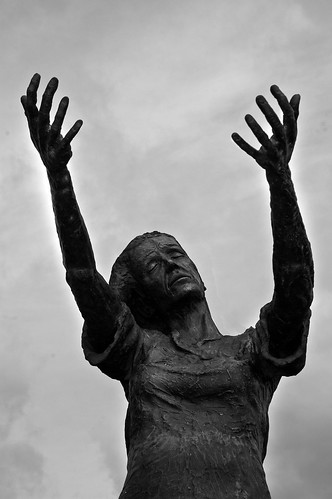Today's Sermon. Text Matthew 24:36-44
When I was a boy, I was fortunate enough to go with my parents on a holiday to Italy. My favourite part was when we visited the ancient city of Pompeii. This city in Roman times was full of life and home to 18,000 people. They were just living their lives when, out of the blue, there was an enormous volcanic eruption which rained down hot ash on the city. Many managed to escape, but 2000 people didn’t, they were buried alive. Today you can walk through the city streets and see ancient shop signs, houses, and theatres and it’s not hard to imagine that the people there had no idea when they woke up that morning on August 24th AD 79 that it would be their last day on earth.
The second coming seems all a bit like something from a Hollywood movie, something fantastic and theatrical. I think it's one of those times when the Bible uses metaphorical (or picture) language to convey to us what it will be like.
The most important thing about chapter 24 in Mathew's Gospel is to remember that it is primarily about the end of the world’s history. History is in a real sense “His Story”. The Kingdom of God came with Jesus’ Incarnation; when He lived among us. The Lord’s disciples, both then and now are citizens of two countries; we belong to this age and in the age to come. As Micheal Green puts it “”We are not what we were, but equally, we are not yet what we shall be”(1). History is steadily moving to the day when God’s Kingdom will be “Consummated”, that is achieved and fully realised. Jesus’ return will settle forever the destiny of all people. There will be no sitting on the fence, either we are with Him or we are against Him (cf. Matthew 12:30)
Our reading begins with the Lord saying:
‘But about that day and hour no one knows, neither the angels of heaven, nor the Son, but only the Father...’ (36)
Only the Father knows when the end will come, not even the Lord Jesus in His human nature knew, nor should we give any heed to anyone who claims they know when it will be either! There have over the centuries been many people who have tried to predict when the second coming would be. One of the most famous was a chap called John Napier, a sixteenth-century mathematician. He applied logarithms and all sorts of clever formulae he had invented and applied it to the book of Revelation (the last book of the New Testament). He then calculated that Jesus would return sometime between 1688 and 1700. His book sold like hot cakes and went into twenty-three editions - until 1701, when sales unaccountably plummeted!(2)
To help His disciples understand what His second coming would be like, the Lord Jesus then says:
For as the days of Noah were, so will be the coming of the Son of Man. For as in those days before the flood they were eating and drinking, marrying and giving in marriage, until the day Noah entered the ark, and they knew nothing until the flood came and swept them all away, so too will be the coming of the Son of Man. (37-39).
The people In Noah's day would have had a hard time believing the warnings that a great cataclysmic flood was going to sweep them away, even though Noah was building a great big Ark (as a more than subtle hint)! If they really suspected that the end was coming they would have asked Noah if they could get on board. The people in Noah’s day were just getting on with their lives, just like we do today, they were eating and drinking and marrying right up until the end. The warnings are there for us too, though we have something much greater than an Ark to find safety in, we have the Lord Jesus Christ; He is our Ark, it is through believing and trusting in Him as our Lord and Saviour that we find eternal safety and salvation.
We do not know when the end will come but the door of the Ark is still open and there is still time to get on board, why wait, we do not know how long we have, it may be tomorrow for all we know?
The Lord Jesus explains things further when He says:
Then two will be in the field; one will be taken and one will be left. Two women will be grinding meal together; one will be taken and one will be left. Keep awake therefore, for you do not know on what day your Lord is coming. (40-42)
It is clear that once the final day arrives, all opportunity for repentance will be gone, the door is shut. These are very sobering verses which act as a clear warning to us. If we are not on board the Ark of Christ we shall be left behind, lost forever, there will be no second chance.
Jesus is pleading with us - ‘get on board, take my hand, quickly, now before it is too late.’
He continues:
But understand this: if the owner of the house had known in what part of the night the thief was coming, he would have stayed awake and would not have let his house be broken into. Therefore you also must be ready, for the Son of Man is coming at an unexpected hour. (43-44)
Anyone that has had their house broken into will be able to relate to this. It happened to Sonja and I once, in our previous Rectory. We came back one evening to see a couple of windows broken open and saw that they had tried to break into the very strong filing cabinet in the study, making quite a mess of it in the process. Of course, if we had known what time the burglar was coming we would have been ready, we would have had all the lights on in the house and let it be obvious that we were there, so the burglar would not have bothered trying to break in. The Lord Jesus urges us to live lives of constant readiness for His return, to live in joyful hope and expectation that He is coming at an unexpected hour.
Probably most of you have heard of or read some of John Grisham’s novels, such as The Firm, Pelican Brief, and The Client. Despite his fame and wealth, Grisham makes a concerted effort to focus on things that have lasting meaning, including his faith in God. Grisham remembers, as a young law student, the remarkable advice of a friend:
“One of my best friends in college died when he was 25, just a few years after we graduated from Mississippi State University. I was in law school, and he called me one day and wanted to get together. So we had lunch, and he told me he had cancer. I couldn't believe it.
"What do you do when you realize you are about to die?" I asked.
"It's real simple," he said. "You get things right with God, and you spend as much time with those you love as you can. Then you settle up with everybody else."
Finally he said, "You know, really, you ought to live every day like you have only a few more days to live."
Grisham concludes: ‘I haven't forgotten those words’”.
Will Norton, Jr., in Christianity Today.Christian Reader, Vol. 32, no. 6.(3)
Let us make the very best use of the time we have left, because no matter who we are the time is short and will go very quickly. Let us make sure that we know Christ as our Lord and Saviour and let us make sure that we are living lives of readiness and expectancy: What would we like Jesus to find us doing when He returns? Then let us be doing that thing. Amen.
-----------------------------------------------------------------------
(1) Matthew for Today, Michael Green, Hodder & Stoughton, 1999, p.229
(2) From Scripture Union Bible Notes “Closer to God”, No.12, 2001.
(3) http://preachingtoday.com/search/?type=scripture&query=Matthew%2024:36-44&start=21






